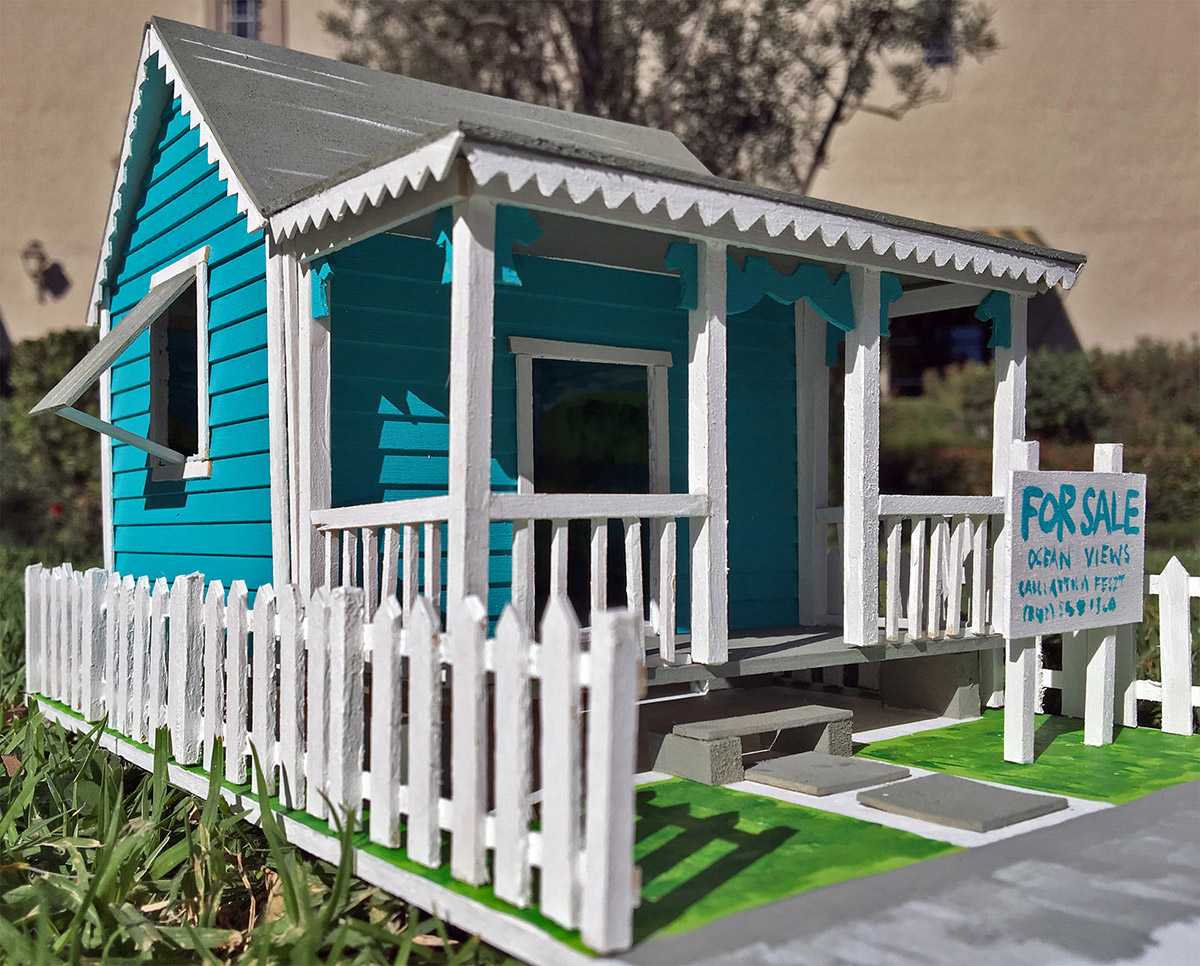
I have visions of colour rubbing up on each other, sliding over liquid slopes of sun-drenched limestone and bleached out roads, deepened by heat and dust. Colour capturing what we do not see, but refuse to ignore. Islands are aloof, detached, yet our islands lay under the vibrant eyes of people who do not know this. They have always travelled, always ventured, always known that life is bigger than us, bigger than this island in the middle of the water, surrounded by beaches of no value until the new people came and barred these things from our lives.
And colours run savagely across sun-drenched landscapes. Bright and salient water washes over unsuspecting reflective sands which tingle and glint under the unforgiving sunlight of the ‘tropics.’ Our waterscapes belong to no one, but us. Our coasts are our colourful and a collage of humanity mixing with inhumanity, slammed up against the silent resistance to my disappearance. I lie prostrate on a ground of melting asphalt under a hotter more radiant sun of never before seen proportions. Beaches are fenced in and closed off from my un-prying eye.
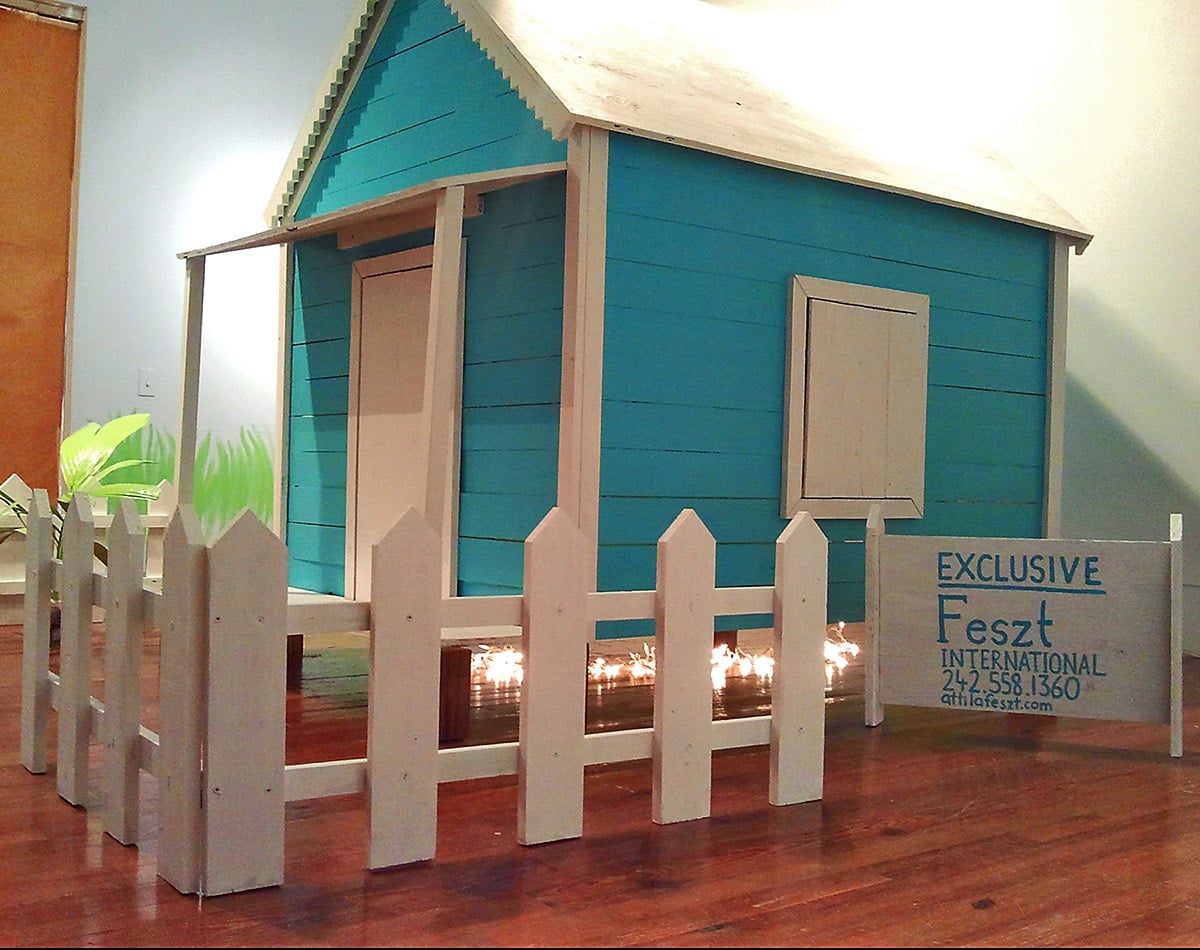
Attila Feszt. Fake Plastic Trees. Installation shot in Project Space Room as a part of the National Exhibition 8.
Colour mixed with light melted down with noise and rebuilt with a spoonful of flavour keeps us alive. Always plant the okras away from your house, they attract ants. Water in the cool of the evening and never throw water wastefully on the hot ground, it will disappear.
Images of islands, idyllic homes, picturesque landscapes, quaint and quiet roads, no cars racing up and down, no police, no ambulances, no crime, no poverty, splendid beaches and book-reading in a hammock life where we slumber along.
Stephen Mouson’s text A living tradition: Architecture of the Bahamas, works around some of these island images. These images as depicted in picture postcards and transcribed in lyrics of song that attract tourists to tropical shores butt up against the bawdy, boisterous, loud, bright, discordant but still beautiful colours and unfitting accidents of spaces in collision with each other, the difference between where I live and where they visit revisit that old idea of paradise off limits to locals.
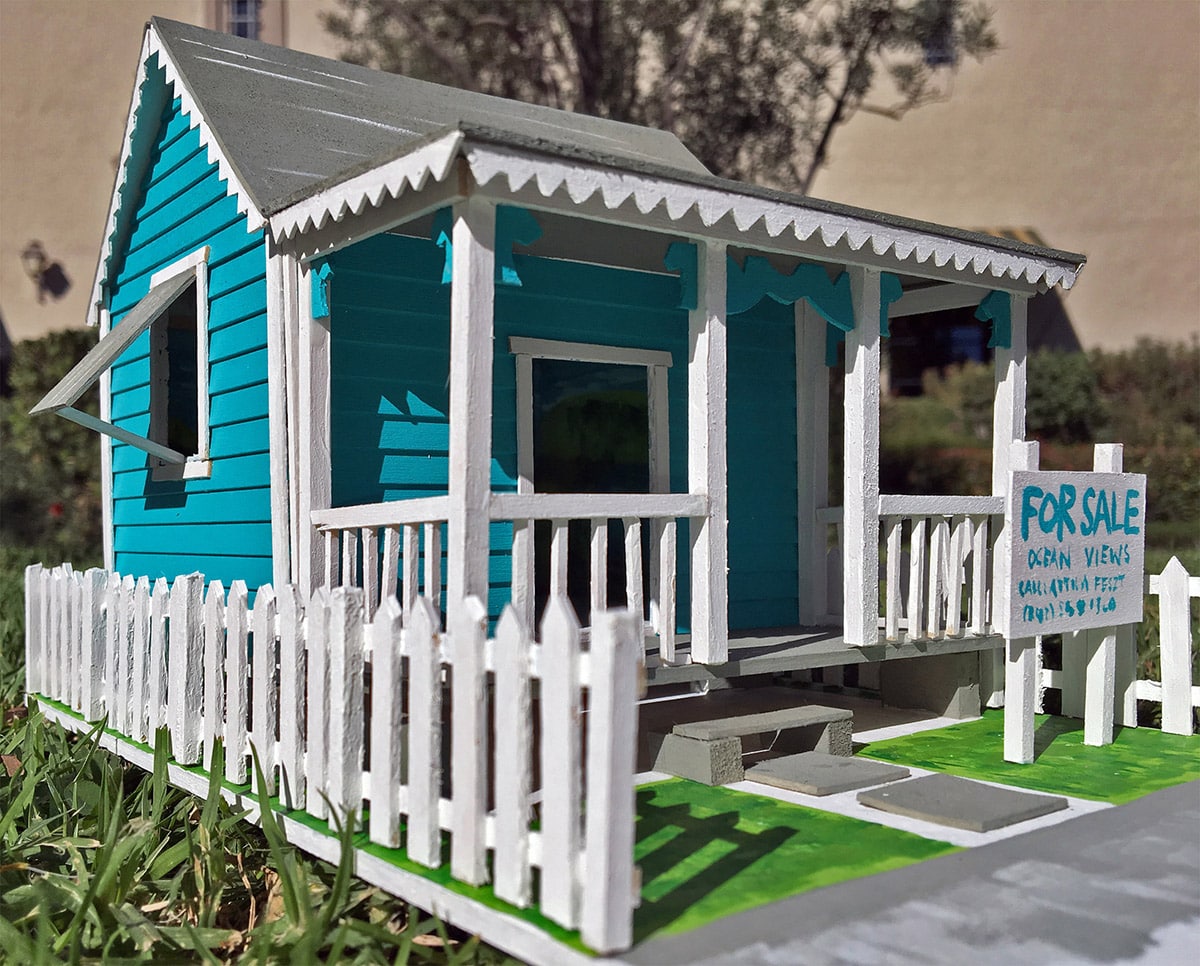
Attila Feszt. Fake Plastic Trees model mockup proposed for the National Exhibition 8. Image courtesy the artist.
NE8 participating artists Dave Smith’s ‘Passin thru’ and Attila Feszt’s installation ‘Fake Plastic Trees’ have put together, though not in the same room or at the same time, a clash of ideas and colours, perhaps even of sounds, that provide a kaleidoscope of images and meanings that work together to roughen the sea. Though working through different media and at different times, these two artists’ works have collided in my mind to create a story that is far too often being overlooked and/or forgotten to the sweet sounds of yellow bird over the tinned music at the newest hotel resort that has catered to aclass of travellers who do not want to be seen by the plebs in Paradise but want to be in Paradise.
Two things aside from the amazing juxtaposition and disharmony and tropical bliss of this work that struck me was how they speak to a recent New York Times piece, ‘ President Trump’s Island Mentality’ which reduces all of us islanders to:
1. remote, detached, or aloof
2. illiberal or narrow-minded
3. isolated or separated
Dave Smith. “Passin thru.” Acrylic on Canvas, 48” x 144”, 2016. Image courtesy of the NAGB.
These islands have been anything but isolated, remote or even aloof. If there is anything to be said, it should be that we have been far too open. As the heat turns up on the people, we find ourselves facing down two worlds, and the former must always inform the latter and vice versa. Sadly, in the world of Art, what we are usually confronted with has already happened. In the 19th-Century, great Romantic poets works foresaw the gloom and doom, as well as the rot and the harsh beauty of nature. Also, in reaction to the Enlightenment, Romanticism valued the inner broodings and the power of emotion and depth of feeling, so to misquote those poetic masters, over the logic and rationalism of reason. They lived intensely!
As both Enlightenment thinking and Romanticism have deeply influenced our present but also quietly moved into the shadows, we can now live to challenge both schools. We are now a nation for sale. This harks back to the 1984 special report created by Carl Hiaasen and Jim McGee of the Miami Herald that explores the rife corruption in The Bahamas. As studies show, when corruption increases in a well-off country, one can note the deterioration in the driving etiquette and observation of road rules. We are facing another kind of sale, and this time it is the literal sale of everything for a song.
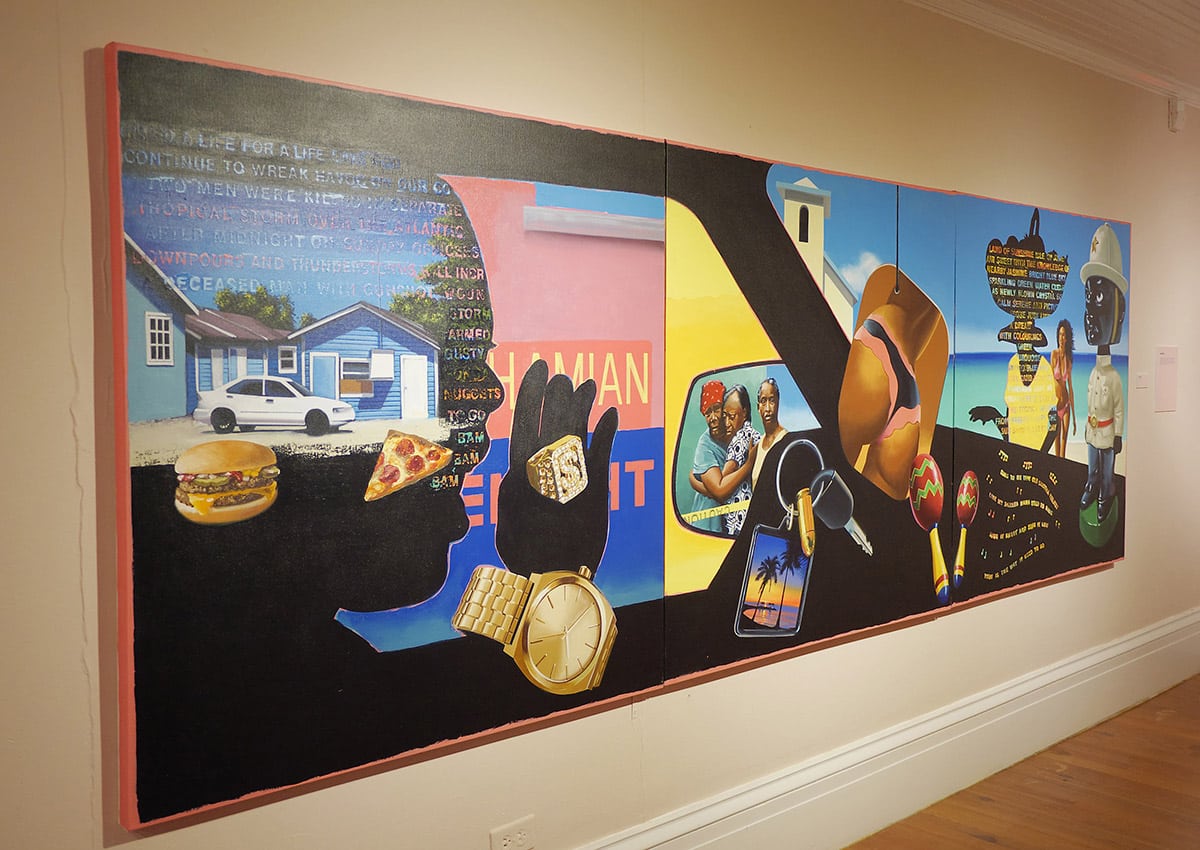
Dave Smith. Detail of “Passing thru”, Acrylic on Canvas, 48” x 144”, 2016. Image courtesy of the NAGB
Smith’s and Feszt’s works untie the strings that blinker our eyes from what is afoot. The Romantic notion of serendipitous cohabitation is trounced by the stark juxtaposing, in Smith’s work, of the local colour and the exotic space. Here spaces collide as much as they do not harmoniously coexist. When people come to paradise, they come to enjoy the local beauty, soak up the soundscapes, and enjoy the warm hospitality that means people leave you alone enough for you to enjoy yourself. The new rendering of Paradise as Feszt shows is everyone buying their piece and moving it out of the world where they enjoyed the local colour and tradition. His ‘Fake Plastic Trees’ installation exudes ironic spice and seriously examines the concept of a nation for sale or even paradise for sale. How can we sell paradise when we have nowhere else to go?
Bahamian culture cannot survive without the very land we need to live on. One time ago, people leased land that would revert to the landlords at the end of the lease cycle. This has changed. How is this sustainable?
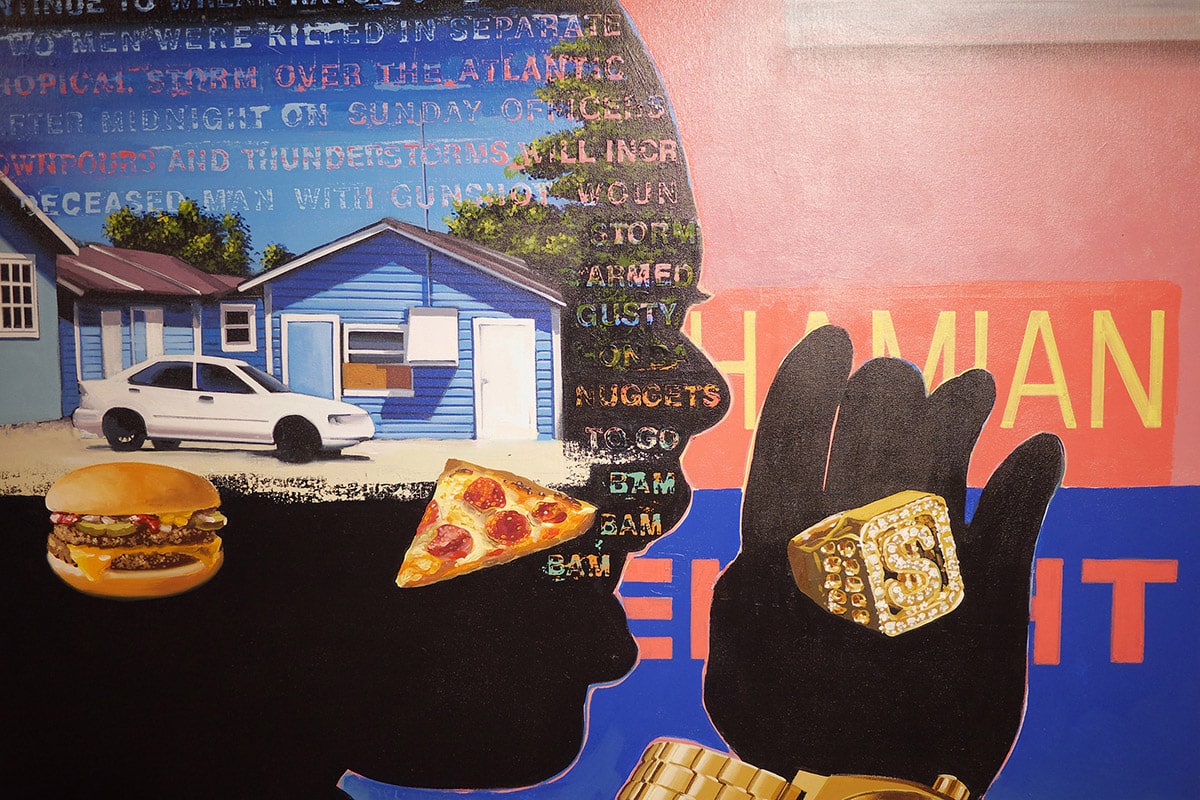
Dave Smith. Detail of “Passing thru”, Acrylic on Canvas, 48” x 144”, 2016. Image courtesy of the NAGB
Both Feszt and Smith use colour to create happiness that is undergirded by an unsustainable nightmare of death, crime, murder, consumption and a rapidly changing, if not vanishing landscape where locals are casualties to the almighty dollar. If there is one thing islands are no longer, it is detached and or isolated, remote and narrow-minded. The colours may indicate a happy-go-lucky mentality, but the tragedy of this is that our islands are changing and our culture is being eroded through overexposure. What Feszt calls Plastic Fake Trees, a term I think so poetic and a harsh reality check for islands that rely on the pine barrens to attract rain, but choose to bulldoze and replace them with ubiquitous palms, a symbol of tropicality, as expressed in Dr. Krista Thompson’s work.
As we uproot, tear down, build out, get rid of all old clapboard houses that stood the test of time, because, according to insurance companies, they are not insurable, we erase ourselves. It is not unrelated that as we claim to be developing, many of the islands lose their links to the outside world as the usual RBC branches close up shop, up stakes and leave, abandoning the Islanders. Are we to return to ideas of illiberal narrow-minded hiding money under mattresses, as we supposedly did in the early twentieth century? At the same time, bankers, tycoons, and money washers come ashore like the flotsam and jetsam, unchecked and unchallenged and devour miles of sea front views. They leave us landlocked near the landfill. We can be pro internationalization and pro land sales to international persons, but it must be well managed, or we face the threat of simply selling ourselves into disappearance.
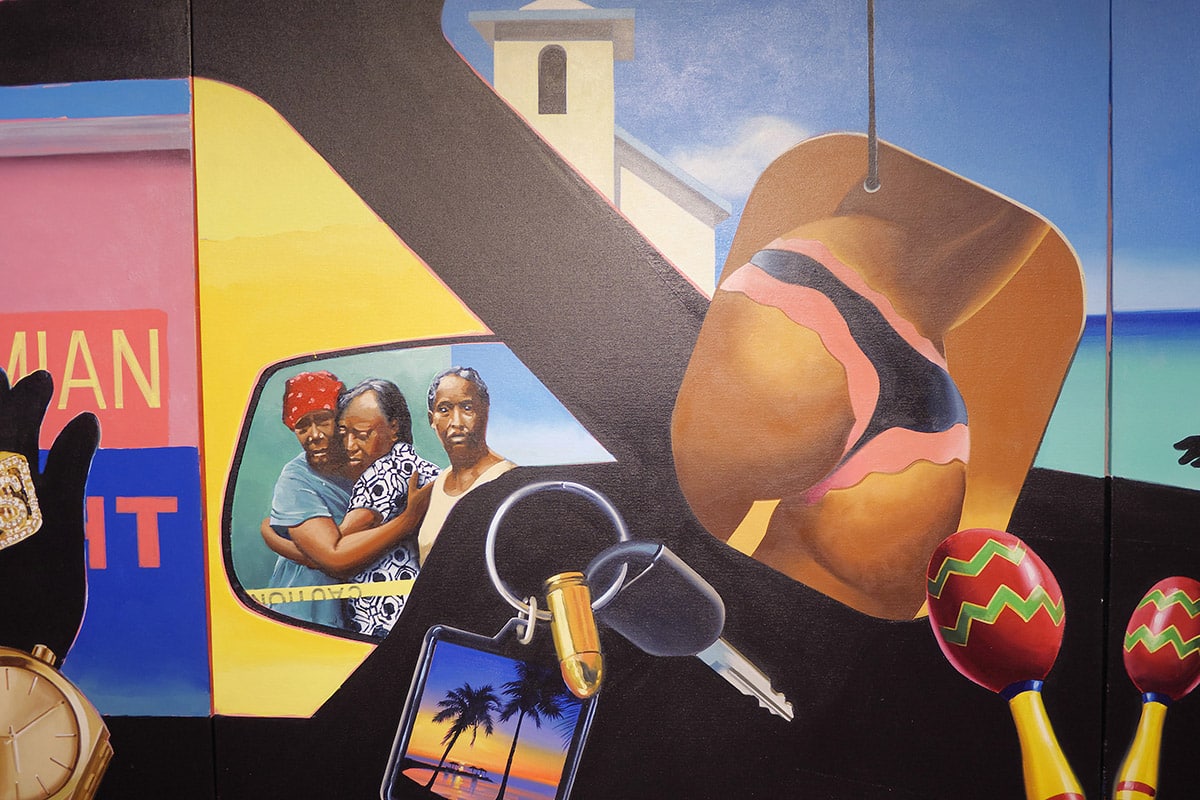
Dave Smith. Detail of “Passing thru”, Acrylic on Canvas, 48” x 144”, 2016. Image courtesy of the NAGB
The amazing beauty of both these works, one an installation, the other a slam of juxtaposing a dying culture under the weight of international consumerism and transnational remapping of spaces and places to serve the tastes of those who visit paradise, want to own a slice, then, once it has been denuded of it nature, plucked of its people, deforested of its thoughts and uniqueness, erased of its difference, will once again up sticks and leave, selling the dream of paradise on to the next consumer, who will never know the cost of development. Small communities become a threatened oasis that quickly vanishes like myriads in the desert.
Feszt’s work ‘Fake Plastic Trees’ opened in the Project Space Room on 21st February and will run until tomorrow, Sunday, March 19. Dave Smith’s work is a part of the provocative and disturbing NE8 show and will remain on view until April 16. How much damage can passin thru do? Can we paste colours without being wiped out of the collage?